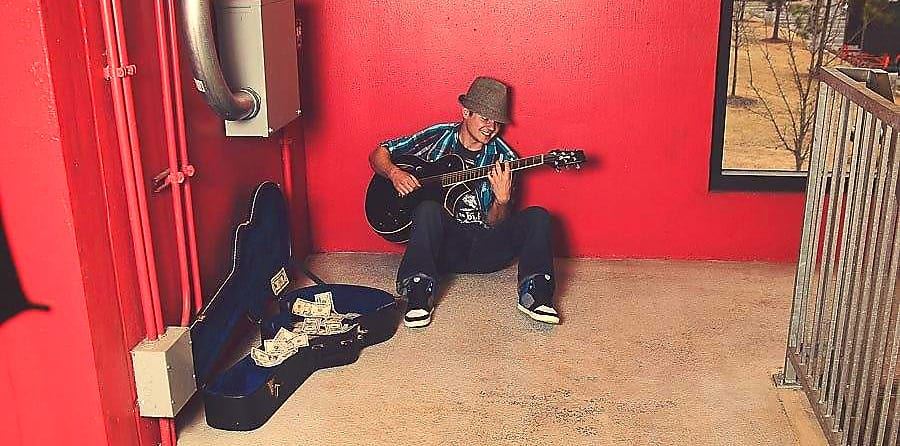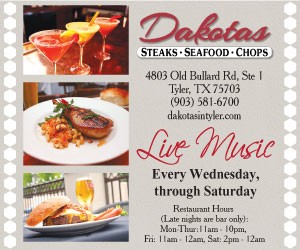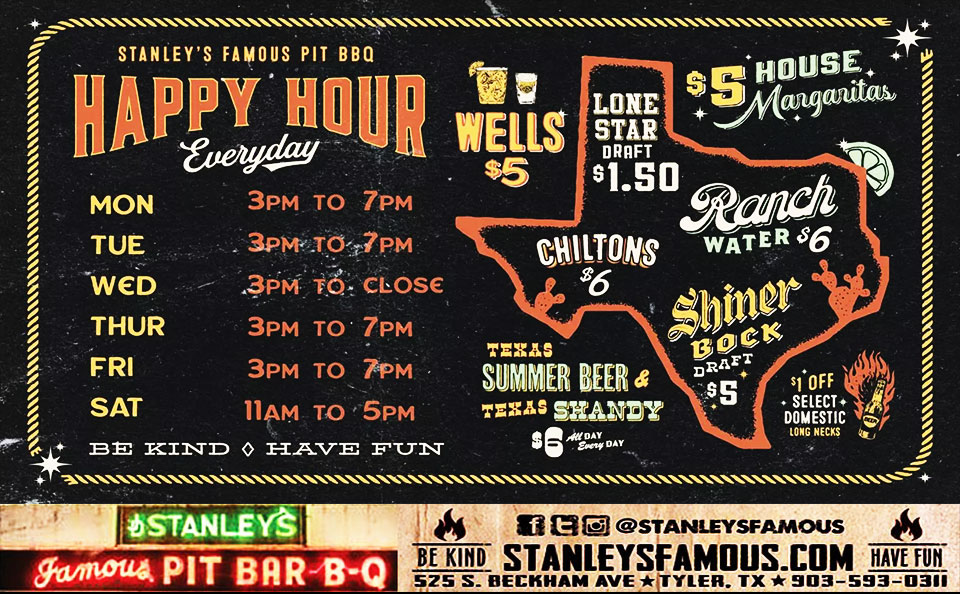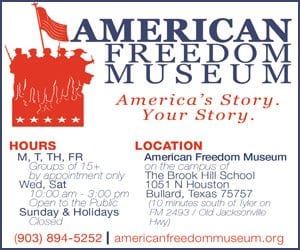By Johnny Griffith
Technology has at times been simultaneously loved and hated by musicians and fans alike over the years but there is no question that it is easier for musicians to do more on an individual basis now than ever before. One East Texan who has embraced technology on his quest to share his love of music with the masses is Levi Kitchen.
Born into an artistic family in Arlington, Texas in 1985, Kitchen’s family moved to Kilgore when his father became an art professor there. Growing up in Kilgore through school and college, he started tinkering with the guitar around age 10.
Heavily influenced by his dad and brothers musical abilities as well as their eclectic taste in performers, Levi quickly went from tinkering with music to full-fledged mastery as he started writing and performing in his teens and eventually majored in musical performance in college.
Later he branched out from guitar and is also capable on drums, bass, piano, trumpet, and djembe but dabbles with other stringed instruments like ukulele, mandolin, and others.
Now, as a solo act with several albums and production credits to his name, Levi performs on stage with his guitar, a loop pedal, and his imagination.
Levi took a break from his current schedule to answer a few questions about what it’s like to be Levi Kitchen.
Johnny: You are known for taking control of the creative process and utilizing technology when you perform to create a virtual backup band through loops and imagination. What drove that choice?
Levi: I didn’t start using a loop station to do a one-man-band show until about six years ago, but the solo idea was certainly built in from the start. I produced my first album at the age of 15, on which I wrote and played everything myself, including the guitars, drums, bass, keys, and turntables. From that point on I knew that I preferred the creative process of writing the songs and building the recordings entirely by myself, but traditional methods die hard, so I spent the better part of a decade playing in about a dozen different bands. When loop stations first started coming out I largely ignored them for years, not realizing the potential. Once again, one of my big brothers influenced me by giving me a very rudimentary loop station that I began to tinker with. It wasn’t long then before I realized that I could build an entire performance around the concept of looping sounds live.
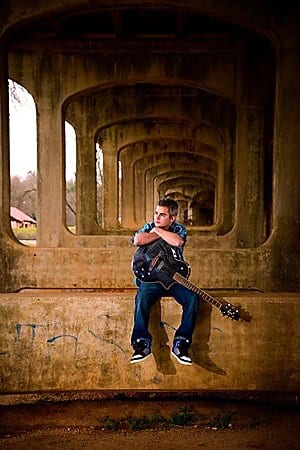 Johnny: What are the challenges of using the loop pedal during the gig, and how receptive have audiences been to your style in this area so heavily dominated by country and rock?
Johnny: What are the challenges of using the loop pedal during the gig, and how receptive have audiences been to your style in this area so heavily dominated by country and rock?
Levi: The challenges are many. For one, getting your timing right is crucial. If you miss your loop timing by the tiniest fraction of a second the song is essentially ruined. Doing all the complicated timing with your feet, while playing and singing or beatboxing at the same time can be mentally taxing. It requires a honing of intense multitasking. It took years of doing this process repetitively to get to the point that I don’t ruin at least one loop per show.
As far as how receptive audiences in this area have been, I’d say they were not very interested in it at first. Some people still don’t understand what I’m doing when they watch me. The people who do get it are always amazed when they realize what’s happening. I’ve made it a point to usually explain the process as part of my show. This seems to help people snap into the groove. As technology advances and more people get exposed to the art of looping, the response has changed. I’ve seen a more positive response recently as people’s understanding catches up with the technology.
Johnny: You’ve been at this for about 15 years, yet you’re still young. What has been the biggest lesson you’ve learned over the first decade and a half?
Levi: “Love, love, love! That is the soul of genius!” – Mozart
Do music because you love it, not because you want attention or money. Do music because you love it, and those other things might follow, but above all, if you’re not doing it because you love it, you will eventually fail or be miserable. I love music more than food. I can hardly bring myself to do other things most of the time. So, love is the biggest lesson in the first fifteen years, but also in the next 15 years. Love will always be the biggest lesson.
My personal goal in life is to bring people joy through music. When I accomplish this task at shows, it gives me a sense of fulfillment and purpose that little else ever has in this life.
Johnny: You’re all over the board with your cover tunes selection for your shows, but how would you describe your original music?
Levi: My original stuff is also all over the board. I write everything from rock to reggae to pop and R&B. There are even some original country, and praise and worship in there. I’ve actually had a hard time being able to categorize what I do, which is part of my problem as an artist. When you can’t be placed in a category with other similar artists, then you are more difficult to find. People will stumble across your music more often when there’s other fan-bases to cross over with. It’s easier to catch traction with audiences of one certain, established style, but I threw caution to the wind on that subject since day one. I never allowed myself to be boxed in by any traditional methods or styles.
As a result, I may be one of the weirdest artists in East Texas, and I’m proud of that. Not that I pursue weirdness for the sake of weirdness. On the contrary, the reflection of my soul emerges as different sounds at any given time. I’ve actually never fully understood how somebody can just be a country artist. Or how they can only be a rock artist. I find that view to be extremely closed-minded. I love music so much, I like to play with it all, in every way I can.
Johnny: How much of your material during your shows is original?
Levi: This will vary greatly from show to show, but I like to keep it at least 20% original or so. I have so much original material that I could easily do a full three hours of it, but people delight in the familiarity of the covers. When faced with an audience that’s never heard me, the balance will shift more towards covers for that reason. Their initial impression will be greatly enhanced by allowing them to hear songs they’re already familiar with. When faced with a crowd that pays attention to my albums and requests original songs, I will lean more heavily on original, of course. It’s all about them and bringing them joy, in whatever form they request it in.
Johnny: You have several albums on your website. Did you self-produce all of these? If so, how has that process helped you hone your live show quality?
Levi: I do produce all of my own recordings, but it doesn’t stop there. I produce other artists as well. I’ve had the privilege of having artists drive here all the way from Los Angeles and Nashville to record in my little studio. If I had to guess, I’d say over the years I’ve been the engineer/producer for literally thousands of original songs for myself and other artists. The knowledge of production helps tremendously in understanding how to manipulate frequency ranges in the live setting. I can tackle sound issues in a heartbeat because it’s never confusing. Recording and producing for so many years aided in the understanding of all things musical and sound related.
Johnny: What are you most excited about coming up in the new year?
Levi: I’m very excited about putting out a new album, but also about playing more often in Dallas. I’ve played Dallas many times before, but for some reason, Dallas seems to be getting more interested lately. I’ll be performing in Dallas five times next month, compared to the two or three times per year I’ve played there in the past.
Johnny: How big of a role has your family played in your success so far?
Levi: The biggest role in my journey has always been my family. They are what started it all, and wherever I end up, it’ll be because of them as much as anything that I manage to do on my own. My parents allowed us to turn their garage into our first recording studio when I was 14. That was one of the biggest decisions to ever affect my life. My parent’s amazing ability to cope with unreasonable volume and noise for so many years just blows my mind.
Johnny: Do you consider yourself a full-time musician or are you still working a day gig to fund the process?
Levi: I have been a full-time musician for 7 years now. I own my own house and studio that I support 100% through musical endeavors. Before I went full-time music, I was also a radio DJ for two years, so in a way, you could even say music was already paying my bills full time as of 9 years ago, just in a different way.
Johnny: What do you try to leave the audience with at the end of a Levi Kitchen performance?
Levi: Joy! My primary focus in life is to bring people joy through music.
Aside from that, I try to leave them with an opportunity to rethink the stereotypes our society has attached to music as well as allow them to walk out with undamaged ears. I want to stimulate their neurons with one of the finest brain stimulants ever discovered: music! (Seriously, do some research and read the studies if you’re not familiar with the myriad of brain benefits of music.)
For more info on Levi Kitchen and to listen to his music go to levikitchen.com.


